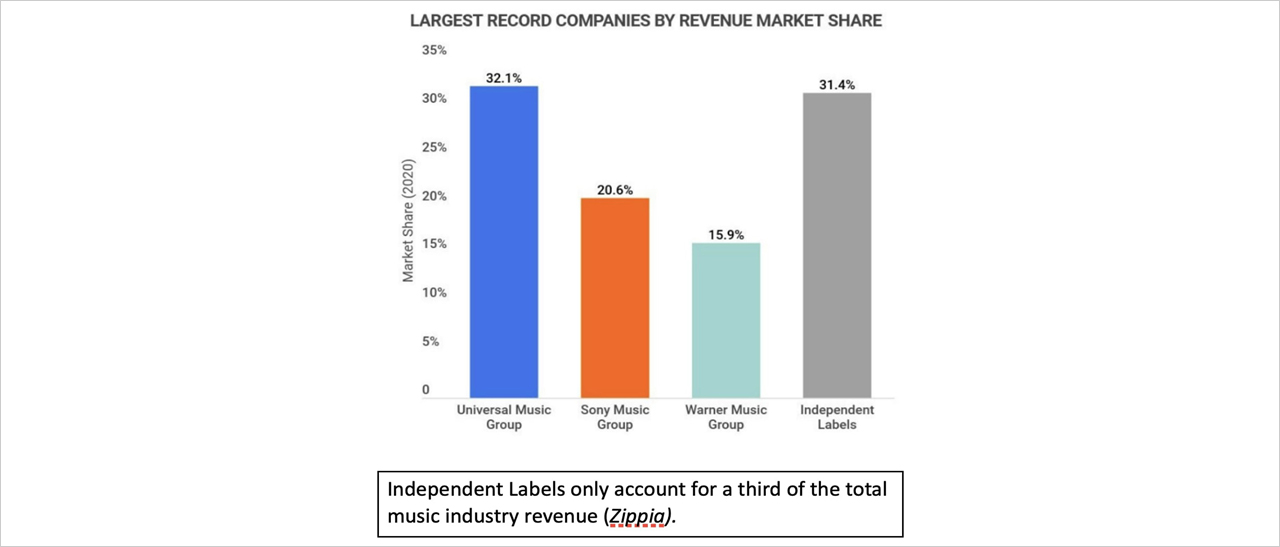
Many children from all over the world have dreams to "make it", both financially and socially, as a top musician. Even though the music industry is growing in revenue, popularity, and accessibility around the world, artists make a fraction of the money that they could earn. This leads to questions about whether the current direction of the music industry is the correct one for all involved.
In 2021, the music industry had a revenue of $25.9 billion, up from $20.6 billion in 2020. Areas that saw large growth in music revenue include North Africa and the Middle East region along with Latin America — experiencing 35.0% and 31.2% increases in revenue, respectively.
One trend that is dictating the future of the music industry is that there are 523 million people who paid music streaming subscriptions globally in 2021, an increase of 80 million subscribers from 2020. Due to platforms such as Spotify and Apple Music being extremely popular with people around the world, 65% of the music industry's global revenue comes from music platforms. The source of revenue includes both subscription audio and ad-supported (unpaid subscription) streams.
Given how much revenue streaming services account for, it is unfortunate that independent record labels only account for 31% of the total streaming service revenue. In fact, the largest record company, Universal Music Group, brought in 32% of the total streaming service revenue in 2021.
In terms of which streaming service dominates the industry, the clear front-runner is Spotify, which has 31% of the total subscribers of the music streaming market — the largest subscriber base out of any streaming service. It is also one of the streaming services that pays its artists the least amount of money at $0.003–$0.005 per stream. For context, Apple Music — Spotify's main music streaming rival — has 15% of the music streaming industry's subscribers but shells out a much more palatable $0.00783 to artists per stream, the third highest among music streaming platforms. Napster ($0.019 per stream) and TIDAL ($0.0125 per stream), two smaller streaming platforms, pay their artists the most money per play.
Sean Parker, the co-founder of Napster and an investor in Spotify, believes that large number of illegally downloaded songs provided the foundation for the streaming industry to grow.
"When Spotify started we believed that somewhere between 4 and 10 trillion songs were illegally downloaded every year, while only 4 billion or so legal downloads happen per year," said Parker. "Once you're willing to admit that and address it, you then have to ask yourself, what are people willing to pay for? The answer is convenience and accessibility."
The fact that artists get paid very little for plays of their music on streaming services in addition to the finding that 35% of internet users access music via copyright-infringing methods (as of 2017) has led some in the music industry to question whether listening to music on streaming services should really be the future of how humans consume music. Scott Arey, the CEO and founder of music company Community Musician, has been one of the more vocal proponents over the last few years to reward independent artists for their work rather than large record companies and music streaming platforms.
"If artists have virtually no chance to make money, either directly or even indirectly, from recorded music, there just won't be any new recorded music in the future," said Arey. "At least none that's really worth listening to."
To give individual artists a larger share of the profits, Arey and Community Musician has created and patented, the "Collectible Music Card" that fans can purchase directly from their favorite artists. Fans can tap these cards with their mobile devices in order to listen to music from the artist. Collectible Music Cards ensure that the profits go directly to the artist, rather than a large streaming platform or other middle-man-like services.
While Arey acknowledges that there is still a long way to go, he is more than ready to fight for the necessary change.
"Speaking for my fellow entrepreneurs, I can tell you we're always looking for a competitive angle to disrupt the current paradigm," said Arey. "Our collectible music card is more affordable for artists and gives consumers the same convenience as streaming, without ripping off the artists they love. Consumers and artists win, and the streaming services will no longer get an unearned free ride."